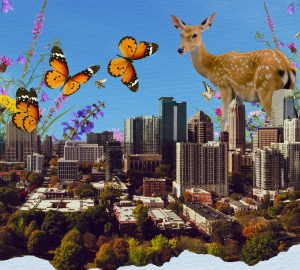By Gray Chapman
 West Indian novelist Jamaica Kincaid came to SCAD-Atlanta to give a lecture and hold a writing seminar for students this past Tuesday, October 21. Kincaid discussed the practice of writing and her life as a writer with a small group of about fifteen students that afternoon at the newly opened Ivy Hall. Later that evening, Kincaid spoke to a larger audience in the 4C event space, explaining how her background and family shaped her vision as a writer.
West Indian novelist Jamaica Kincaid came to SCAD-Atlanta to give a lecture and hold a writing seminar for students this past Tuesday, October 21. Kincaid discussed the practice of writing and her life as a writer with a small group of about fifteen students that afternoon at the newly opened Ivy Hall. Later that evening, Kincaid spoke to a larger audience in the 4C event space, explaining how her background and family shaped her vision as a writer.
Born Elaine Cynthia Potter Richardson in 1949 on the West Indian island of Antigua, Kincaid has written many works of poetry, memoir and essay. Though she has lived in America since the age of 16, many of her works take place in the Caribbean where she was raised. Her work addresses varied themes, such as the nature of the mother-daughter relationship, the negative effects of colonialism, the development of personal identity in light of colonial expectations, and the phenomenon of female bonding. Though some critics have accused Kincaid of being nihilistic and depressing, Kincaid has embraced this view, stating that it must be her purpose in writing to make others feel unhappy.
Kincaid explained that, growing up in the British colony of Antigua, her education glorified the British empire — leading her to resent some cultural aspects of Britain that were spread to the Caribbean and, eventually, inspiring her to write about the negativity behind colonialism. This dynamic was further explored, said Kincaid, in her writings about her mother. “My relationship with my mother was very similar to that between a colony and the mother country,” said Kincaid. “I did, in fact, begin to write out of a feeling of grievance toward my family.” She explained that the voice of her mother has permeated many of her works, particularly her poem “Girl.”
“I wanted to write something that, when other writers read it, it would make them never want to write again,” said Kincaid. “Out of this strange, demonic desire came a one-sentence story that is the voice of my mother throughout my life,” Kincaid said, describing the much-anthologized “Girl.”
Kincaid explained that the honesty with which she wrote about her family in Antigua was often not well received. “A writer is a traitor,” said Kincaid, “and I’m Exhibit A. I wrote about all of these people who helped bring me along, and I’m sure they felt betrayed.” Kincaid said that she felt a parallel between her life and that of her brother, who was gay, because neither of them was allowed to be who they truly were while living in Antigua. “Who I am is a writer, and that is not allowed where I come from.”
After giving her lecture and reading from “Girl” and “My Mother,” Kincaid answered questions from the audience. When asked for advice, Kincaid explained that her fear of failure was probably what led her to success. “I knew I would fail and that, when I did, my parents would laugh at me,” said Kincaid. “A good thing to tell yourself when you’re writing is that no one will ever read this. That way, you can write it the way you really want to.”

























